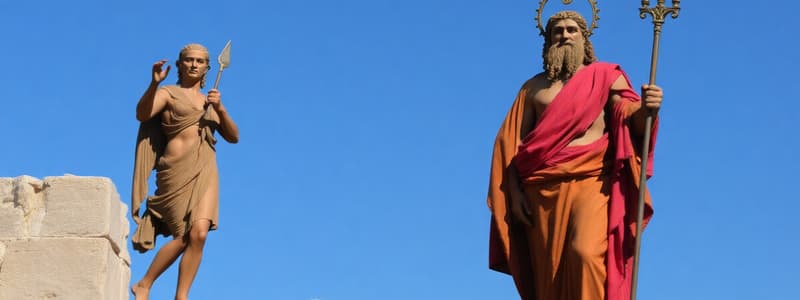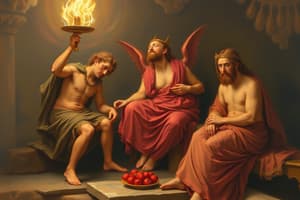Podcast
Questions and Answers
Quae aera contrāria sunt in textu mentionata?
Quae aera contrāria sunt in textu mentionata?
- Boreās et Austrō (correct)
- Mārs et Iūnō
- Eurus et Zephyrō
- Aurōra et Scythiam
Sānctius animal mentisque capācius altae ante hominem erat.
Sānctius animal mentisque capācius altae ante hominem erat.
False (B)
Quod animalia in textu non mentionata sunt?
Quod animalia in textu non mentionata sunt?
Cēra et piscēs
Aurea prīma sata est aetās, quae _ nūllō, sponte suā, sine lēge fidem rēctumque colēbat.
Aurea prīma sata est aetās, quae _ nūllō, sponte suā, sine lēge fidem rēctumque colēbat.
Connecte animalia cum suis locis:
Connecte animalia cum suis locis:
Quis est opifex rērum, qui hominem creavit?
Quis est opifex rērum, qui hominem creavit?
Mundus fuit omnino pacificus prīmā aetā.
Mundus fuit omnino pacificus prīmā aetā.
Caelum est _ et frangit
Caelum est _ et frangit
Quod elementum aeris in primaria verba expositum est?
Quod elementum aeris in primaria verba expositum est?
Iuppiter in carmine videtur asserere dominionem et ordinem saeculi reformationem.
Iuppiter in carmine videtur asserere dominionem et ordinem saeculi reformationem.
Quis est pater omnipotens in carmine?
Quis est pater omnipotens in carmine?
Nocens ferrum _____ nocentius aurum prodierat.
Nocens ferrum _____ nocentius aurum prodierat.
Coniunge partes carminis cum eorum principali argumento:
Coniunge partes carminis cum eorum principali argumento:
Quae proles secunda a prima prōlēs successit?
Quae proles secunda a prima prōlēs successit?
Vēr numquam in carmine describitur.
Vēr numquam in carmine describitur.
Quid fecit pater omnipotens igname doceant?
Quid fecit pater omnipotens igname doceant?
Quis Iuppiterm vidit fessam et custode vacantem?
Quis Iuppiterm vidit fessam et custode vacantem?
Quis coniunx Iovis in historia descripta est?
Quis coniunx Iovis in historia descripta est?
Diana se occulte ab Iove latuit.
Diana se occulte ab Iove latuit.
Quam rem Iuppiter indutus habuit postquam Dianam vidit?
Quam rem Iuppiter indutus habuit postquam Dianam vidit?
Iūno semper probat Semelēs amorem erga Iovem.
Iūno semper probat Semelēs amorem erga Iovem.
Quid Iūno epistula in sermonibus ad Iovem impetrans optat?
Quid Iūno epistula in sermonibus ad Iovem impetrans optat?
Iuppiter dixit, 'hoc certē fūrtum coniūnx mea _______'.
Iuppiter dixit, 'hoc certē fūrtum coniūnx mea _______'.
Quis secundum narrationem in amore ipsum habet?
Quis secundum narrationem in amore ipsum habet?
Match the following characters with their descriptions:
Match the following characters with their descriptions:
Pēnēia timida est et adulescentem non fugit.
Pēnēia timida est et adulescentem non fugit.
Iūno est ______ et coniūnx Jovis.
Iūno est ______ et coniūnx Jovis.
Quid Diana timuit postquam nymphas vidit?
Quid Diana timuit postquam nymphas vidit?
Coniungere deos cum eorum attributis:
Coniungere deos cum eorum attributis:
Quod flūmen Pēnēia invocat ut opem petat?
Quod flūmen Pēnēia invocat ut opem petat?
Amor, cum iuvenem ______ et ______, suum consilium indicat.
Amor, cum iuvenem ______ et ______, suum consilium indicat.
Quis est nutrīx Semelēs?
Quis est nutrīx Semelēs?
Diana cum Iove eleganter et cum laetitia conversata est.
Diana cum Iove eleganter et cum laetitia conversata est.
Semelēs Iovem sine nomine petit.
Semelēs Iovem sine nomine petit.
Coniunge deorum cum eorum actionibus:
Coniunge deorum cum eorum actionibus:
Cynthia iussit nymphas __________ coetū.
Cynthia iussit nymphas __________ coetū.
Quid fit cum Pēnēia precem finiverit?
Quid fit cum Pēnēia precem finiverit?
Quod facit Iuppiter cum nimbis et fulminibus?
Quod facit Iuppiter cum nimbis et fulminibus?
Pēnēia arboris formam reciperet post invocationem fluminum.
Pēnēia arboris formam reciperet post invocationem fluminum.
Quis est collis in cuius dextra Pēnēia sentiat trepidare?
Quis est collis in cuius dextra Pēnēia sentiat trepidare?
Quis character respondit ad adulteram dicens: 'etiam restābat'?
Quis character respondit ad adulteram dicens: 'etiam restābat'?
Arcas erat ignarus de parentis suae identitate.
Arcas erat ignarus de parentis suae identitate.
Quid Iuno dixit de sua potentia?
Quid Iuno dixit de sua potentia?
Iuno invocavit _______ ad __________ suae potentiae.
Iuno invocavit _______ ad __________ suae potentiae.
Connecte personae cum eorum actionibus:
Connecte personae cum eorum actionibus:
Quid significabat 'iniūria partū' in contextu narratio?
Quid significabat 'iniūria partū' in contextu narratio?
Iuno numquam sentiebat poenam pro sua parte.
Iuno numquam sentiebat poenam pro sua parte.
Quomodo Arcas sensit cum matrem suam vidit?
Quomodo Arcas sensit cum matrem suam vidit?
Flashcards
Aurea Aetas
Aurea Aetas
The first age, characterized by peace, justice, and innocence.
Homo
Homo
Human being; the pinnacle of creation
Discordia Fratrum
Discordia Fratrum
Discord among brothers (the gods).
Mundus
Mundus
Signup and view all the flashcards
Sidera
Sidera
Signup and view all the flashcards
Aether
Aether
Signup and view all the flashcards
Animalia
Animalia
Signup and view all the flashcards
Tellus
Tellus
Signup and view all the flashcards
Pēnēia
Pēnēia
Signup and view all the flashcards
blanditiās
blanditiās
Signup and view all the flashcards
vestīgia
vestīgia
Signup and view all the flashcards
ōra
ōra
Signup and view all the flashcards
sparsum
sparsum
Signup and view all the flashcards
fūga
fūga
Signup and view all the flashcards
placuī
placuī
Signup and view all the flashcards
citharae
citharae
Signup and view all the flashcards
Argentea Aetas
Argentea Aetas
Signup and view all the flashcards
Ferrum
Ferrum
Signup and view all the flashcards
Aurum
Aurum
Signup and view all the flashcards
Aetas Ferrea
Aetas Ferrea
Signup and view all the flashcards
Astraea
Astraea
Signup and view all the flashcards
Gigantēs
Gigantēs
Signup and view all the flashcards
Pharetra
Pharetra
Signup and view all the flashcards
Cervis
Cervis
Signup and view all the flashcards
Custos
Custos
Signup and view all the flashcards
Jurgia
Jurgia
Signup and view all the flashcards
Comites
Comites
Signup and view all the flashcards
Rubor Pudoris
Rubor Pudoris
Signup and view all the flashcards
Polluere Fontes
Polluere Fontes
Signup and view all the flashcards
saevam mentem
saevam mentem
Signup and view all the flashcards
fēcunda forēs
fēcunda forēs
Signup and view all the flashcards
iniūria partū
iniūria partū
Signup and view all the flashcards
testātum dēdecus
testātum dēdecus
Signup and view all the flashcards
haud inpūne ferēsadimam tibi namque figūram
haud inpūne ferēsadimam tibi namque figūram
Signup and view all the flashcards
prōnam strāvit humī
prōnam strāvit humī
Signup and view all the flashcards
bracchia nigrīs horrēscere villīs
bracchia nigrīs horrēscere villīs
Signup and view all the flashcards
ōra Iovī lātō fierī dēfōrmia rictū
ōra Iovī lātō fierī dēfōrmia rictū
Signup and view all the flashcards
Juno, dea
Juno, dea
Signup and view all the flashcards
Semelē, filia Cadmi
Semelē, filia Cadmi
Signup and view all the flashcards
Iuppiter, rex deōrum
Iuppiter, rex deōrum
Signup and view all the flashcards
Beroē, nūtrīx Semelēs
Beroē, nūtrīx Semelēs
Signup and view all the flashcards
Invidia, sentimentis Iūnōnis
Invidia, sentimentis Iūnōnis
Signup and view all the flashcards
Fulmen, tēlum Iovis
Fulmen, tēlum Iovis
Signup and view all the flashcards
Amor, cāusa Semelēs mortis
Amor, cāusa Semelēs mortis
Signup and view all the flashcards
Consequēntiae dōnō Iovis
Consequēntiae dōnō Iovis
Signup and view all the flashcards
Study Notes
Dei et Deae
- Jupiter, Juno, Venus, Diana, Apollo, et alii: These are major deities in the text, with varied interactions and roles.
- Saturn, a predecessor of Jupiter: Illustrates a cyclical concept of time/power shifts.
- Mortals respond to the actions of these deities: Human agency and divine intervention are intertwined
- Deities' influence on natural world: Depicted as powerful forces shaping weather, seasons, and fertility.
- Moral and ethical considerations: Stories highlight choices and consequences, particularly those involving love, loyalty, and deception.
Human Experience
- Golden Age: A time of peace and abundance, contrasted with later ages.
- Silver Age: Quality of this age is inferior to the golden age, characterized by toil and conflict, but not entirely evil
- Bronze Age: More violent and warlike, but not completely corrupt.
- Iron Age: Marked by wickedness, betrayal, and the disintegration of morality.
- Human flaws and weaknesses: The characters reveal hubris, deceit, jealousy, and other failings. This leads to suffering and conflict.
- Interaction between gods and humans: The relationship is complex and often fraught with danger and consequence.
Mythological Events
- Creation myth of humans: Humans are viewed as a culmination of divine creation, with unique properties.
- The myth of Phaethon & transformation of nymphs: A tale of transformation, emphasizing the power and arbitrary nature of divine action.
- Stories of punishment and retribution: Stories highlight the divine justice and consequence for transgression. (Various instances throughout the passage)
- Wars between gods and giants: An event marking the establishment of Olympian power.
- Myths of jealousy and love: Illustrates the complex emotions and motivations of the gods.
- Stories of metamorphosis: Transformations from human to animal, or vice versa.
- The myth of Phaethon and the origins of the constellation: This event highlights the limits of human ambition.
Divine intervention in human lives
- The stories in the provided text demonstrate gods' ability to affect the lives of mortals directly, such as through intervention in weather patterns or actions.
- Examples from the text show manipulation of human emotions and interactions.
- The changing fates or misfortunes of humans are linked to actions or choices of the gods.
- Consequences of human actions directly resulting from divine anger or favour.
Style and Structure
- Epic poetry style: The text employs epic, narrative structure, highlighting epic scope and details.
- Use of similes/metaphors: Comparison used to further emphasize descriptions.
- Emphasis on cyclical patterns: Emphasis on cyclical patterns and recurring themes related to human development.
- Narrated by a poet/author: Poet or author recounts the stories through verse.
Studying That Suits You
Use AI to generate personalized quizzes and flashcards to suit your learning preferences.




